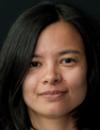Advanced combinations of fluorescence and atomic force microscopy to study Biology at the nanoscale

Prof Cristina Flors, IMDEA
17 November 2022, 1.00pm, In person ONLY seminar, venue School of Physics and Astronomy, Lecture Theatre A
Advanced Fluorescence Nanoscopy Group
Following her degree in Chemistry, Cristina Flors completed her PhD at the Institut Químic de Sarrià in Barcelona in 2004 under the supervision of Prof. Santi Nonell. During that time, she studied the photophysical properties of phenalenone derivatives, with particular emphasis on singlet oxygen photosensitization, using a range of spectroscopic techniques. In 2005 Flors moved to the laboratory of Prof. Johan Hofkens at the Katholieke Universiteit Leuven, Belgium, to learn single-molecule and super-resolution fluorescence microscopy. She investigated the photophysical properties of different molecules such as perylene diimide dendrimers and a range of fluorescent proteins. Her most representative result from that period was the single-molecule characterization of the photoswitching properties of the fluorescent protein Dronpa and its mutants. Importantly, they showed how the thorough understanding of photophysics can help optimize super-resolution imaging (Flors et al, J. Am Chem. Soc. 2007). Having gained expertise in a new technique with great potential, Cristina Flors moved to the University of Edinburgh in 2008 to begin her independent research career, funded by the Engineering and Physical Sciences Research Council and The Royal Society. She started a new research program to develop methodology for super-resolution imaging of DNA based on single-molecule localization (Flors et al, ChemPhysChem 2009; Curr. Op. Chem. Biol. 2011).
In February 2012 Cristina Flors moved to IMDEA Nanociencia with a Ramón y Cajal fellowship as a Senior Group Leader. At IMDEA she continues working on the improvement of super-resolution fluorescence microscopy methods, most recently combining them with atomic force microscopy. In parallel to the super-resolution work, Flors is also interested in the photosensitizing properties of fluorescent proteins and their applications in advanced microscopy and phototherapy.
